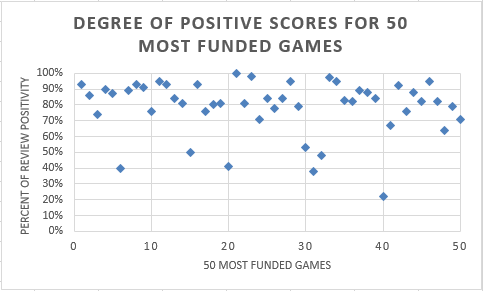Now why is that? I thought about this for a while, taking into account the various ways the games I reviewed were funded and created, and I realized that perhaps the reason most crowdfunded games tend to mostly be average to above average is because of the nature of the videogame crowdfunding process itself. Campaigns to raise money for a project takes a lot of effort, as Ragnar Tørnquist so helpfully explained in our interview last week. Many of the successful campaigns are based on transparency–being up front with backers on what you are doing and why. This involves showing a lot of work! To be put through that constant demand takes a level of dedication that not many have, and this leads them to failure. In this way, videogame crowdfunding can be a sort of crucible process that removes those lacking the work ethic required to make a game. Obviously, this isn’t always the case.
But for those game devs who manage to succeed at a campaign, then actually release their game, it is my estimation that the chances of the title being at least average to above average goes up (again, with some exceptions.) Our own Marcus Estrada ran the numbers a while back for the average scores of the top 50 funded games, and they seem to support this idea. Will this always be the case, though? We’re starting to see a trend in which it is harder for games to even be crowdfunded to begin with, and more gamers are looking critically at those studios that do receive funds and release a product.
I think the bottom line will be player preference. Are games receiving good ratings from the people who love the genre and format? Personally, I always try to take into account my own prejudices and what others might feel and think when playing a game for the first time. Here at Cliqist, our ultimate goal is to share our love of videogame crowdfunding, and to help inform you, the readers, on what you need to know to make an informed decision when purchasing or backing a project!





I wholeheartedly agree with this assessment. I’ve backed plenty of crowdfunded games and of those released and that I’ve played so far most at least rate as average to me. I’ve reviewed a number of projects over at Kickstart Ventures and the lowest score I’ve given any of them still rated a respectable 3.5/5.
Of course, I’m also biased and feel that indie games (crowdfunded or otherwise) tend to have a superior experience to the AAA titles.
i am very very picky on what i back….though could call it fussy games i have backed often for nostalgic reasons like pillars of eternity due to being like baldurs gate or beasts fury as i love fighting games
A lot of my most anticipated games are Kickstarter games now. Although I would say in general these days I’m discovering a lot more indie games that genuinely interest me and that I end up really enjoying. The indie scene has really exploded in the last few years and everyone is benefiting……even people who love more obscure genres or ideas.